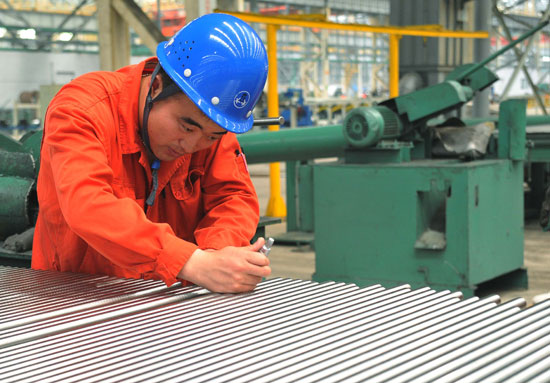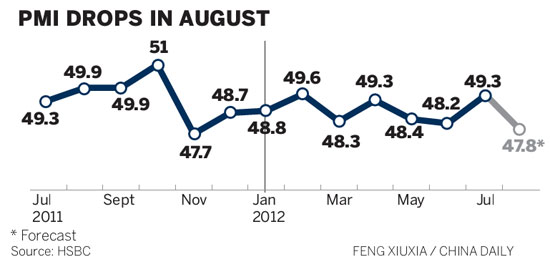
Industry hit by global economic woes and weak domestic demand
China's manufacturing industry may deteriorate further in August, affected by a faster drop in new orders and no significant signs of any improvement in the global economy, which analysts say could spark Beijing to accelerate plans to ensure growth.
New figures on the sector, in the HSBC Flash China manufacturing purchasing managers' index, showed a sharp fall, to a nine-month-low reading of 47.8 in August, down from July's 49.3.
 |
|
A worker at a processing plant owned by Dongbei Special Steel Group in Dalian, Liaoning province. An HSBC forecast reading of the manufacturing purchasing managers index fell to 47.8 in August from 49.3 in July. [Photo / China Daily] |
A reading of less than 50 means contraction, and the dropping figures suggest factories across the country continue to suffer.
The report said that Chinese producers are struggling with both strong global economic headwinds and weak domestic demand, suggested by the five-month-low sub-index reading on output, which declined to 47.9 from 50.9 in July.
New export business also declined at its sharpest rate since March 2009, adding further concern about dropping overseas demand amid the deepening European debt crisis.
Private business across the eurozone showed a seventh monthly decline in a row in August, with analysts warning that the single currency area is at a pivotal point if it is to escape a prolonged recession.
The keenly watched flash PMI, a survey of 5,000 eurozone businesses compiled by Markit, the global financial information services company, came in at 46.6, slightly above July's score but well shy of the neutral 50-mark meaning yet more contraction.
 |
Industrial slowdown
"The growth rate of industrial output may continue to slow in the future," said Qu Hongbin, chief economist at HSBC China and co-head of Asian Economic Research at HSBC.
"To achieve the stated policy goal of stabilizing growth and the jobs market, Beijing must step up policy easing to lift infrastructure investment in the coming months," he said.
As the manufacturing industry is a main pillar of the economy, a deteriorating PMI suggests that the economic momentum may face more downside risks in August, according to economists.
The HSBC PMI focuses more on export-oriented and private companies than the official figures released by the National Bureau of Statistics and China Federation of Logistics and Purchasing. That August official PMI is scheduled to be released on Sept 1.
Chinese local governments are keen to map out investment projects to drive up economic growth with additional spending on infrastructure and manufacturing.
This week, two municipalities — Tianjin and Chongqing — announced an extra 1.5 trillion yuan ($236 billion) investment stimulus package in industries including energy, petrochemicals and advanced equipment.
Incomplete statistics show local governments across the country have announced investment plans involving about 7 trillion yuan since July.
Ningbo in Zhejiang province, Nanjing in Jiangsu province, Guangzhou in Guangdong province, and Changsha in Hunan province have all released investment plans that are aimed at boosting growth.
"The effect of policy stimulus through infrastructure investment may not show up as strongly in the HSBC PMI as in the official PMI," said Zhang Zhiwei, chief economist in China with Nomura Securities Co Ltd.
Zhang predicted that the slumping indicator would put pressure on local governments to continue promoting growth through investment projects.
"Weak PMI will put more pressure on the People's Bank of China to loosen monetary policy by cutting the reserve requirement ratio," he added.
Key economic data released earlier this month for July — including trade, industrial output and retail sales figures — pointed to continued weakness in the economy and raised hopes for further monetary easing.
Still, Premier Wen Jiabao has expressed confidence that the economy would stay on track and be able to meet targets this year, including annual growth of at least 7.5 percent.
The central bank has cut interest rates and lowered reserve requirement ratios for banks in a bid to spur lending to prop up the economy.
AFP contributed to this story.
Contact the writer at chenjia1@chinadaily.com.cn
Chinese manufacturers' confidence dip
SME manufacturers hammered by European economic slump

 Washington to remain focused on Asia-Pacific
Washington to remain focused on Asia-Pacific RQFII target blue chips amid bear market
RQFII target blue chips amid bear market Australian recall for top two exporters
Australian recall for top two exporters China fears new car restrictions
China fears new car restrictions